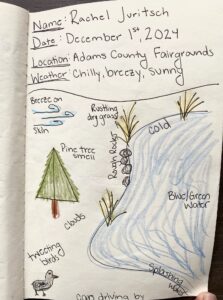 Winter can be a challenging season for everyone. We can relate to the feeling of being stuck indoors, eager to get outdoors. However, some families may find it more difficult to spend time outdoors due to cold temperatures or windy weather. Research shows that we can benefit from just 20 minutes spent outside each day, and these advantages hold true in winter as well.
Winter can be a challenging season for everyone. We can relate to the feeling of being stuck indoors, eager to get outdoors. However, some families may find it more difficult to spend time outdoors due to cold temperatures or windy weather. Research shows that we can benefit from just 20 minutes spent outside each day, and these advantages hold true in winter as well.
Benefits of Spending Time Outside in Winter
 Vitamin D Production: Exposure to sunlight helps our bodies produce Vitamin D, which is essential for healthy growth and bone development.
Vitamin D Production: Exposure to sunlight helps our bodies produce Vitamin D, which is essential for healthy growth and bone development.- Enhanced Mood and Well-Being: Spending time outdoors can improve overall mood, health, and feelings of well-being.
“I go to nature to be soothed and healed, and to have my senses put together.” – John Burroughs
December 21st marks the shortest day of the year, receiving nearly six hours less sunlight than the longest day in June. With shorter days and reduced sunlight, many people experience the “winter blues.” However, researchers have found that spending time outdoors, moving, and connecting with others can significantly alleviate these wintertime feelings.
Tips for Success
- Check the Weather: Colorado weather can change quickly. One day might be sunny and warm, while the next could bring snow. Staying informed will enhance your outdoor experience.
- Dress for Success: With the weather in mind, make sure to dress appropriately! On snowy days, don’t forget your boots, gloves, hats, and layers.
- Affordable Winter Clothing: Winter gear can be expensive, but thrift stores often offer budget-friendly options. Friends and family clothing swaps are another great option!
- Explore New Places: Now that you’re prepared, start locally and then venture to other parks, open spaces, and trails!
Encourage Children to Get Outdoors
Spending at least 20 minutes outside each day can help boost a child’s health, and shake off those winter blues. Remind them that even though it may seem like animals and plants are asleep, there’s still a lot of life waiting to be discovered outside, you just need to slow down and listen. Tell your child that they will have to turn on their observation skills for this outside activity. Take a moment to discuss what an observation is: it’s simply something they notice in their surroundings! Encourage them to start a nature journal.
Nature Journaling with Children
- Personalize Your Journal: Spend some time decorating and personalizing a blank journal to give your child a sense of ownership.
- Discuss Nature Journaling: Explain to your child what a nature journal is. According to John Muir Laws, nature journaling involves collecting and organizing your observations, questions, connections, and explanations using words, pictures, and numbers.
- Review the Five Senses: Before heading out, review the five senses with your child and provide examples for each. (The five senses are sight, smell, hearing, taste, and touch)
- Go on a Nature Walk: With a pencil and journal in hand, take a 20-minute walk, encouraging your child to engage all their senses. They can write down their observations as they go or save them for when they’re warmer indoors. Together, illustrate or write about your winter discoveries.
- Document Your Experience: Remember to include your name, date, location, and weather conditions in the journal, so you can compare your findings next time!
Before you go outside with Children:
-
- Dress Appropriately: Collaborate with your child to choose the right warm clothing for a safe and enjoyable time outdoors. Check the weather forecast or simply step outside to gauge the conditions.
- Discuss the Benefits: Explain to your child that time spent outside in the sun helps our bodies grow strong and healthy. Additionally, it is a chance to get fresh air and move around!
- Prepare Beyond Clothing: Remind your child that sunscreen is important, even in winter. It protects our skin from harmful rays while still allowing our bodies to produce Vitamin D for healthy bones. Use a broad-spectrum sunscreen with an SPF of 15 or higher! Remember to reapply every two hours. Hydration is also key! So, pack a water bottle.
This article is an excerpt from the December 2024 “Family Matters Newsletter”, published by Colorado State University Extension. This free newsletter is available monthly in English and Spanish.

